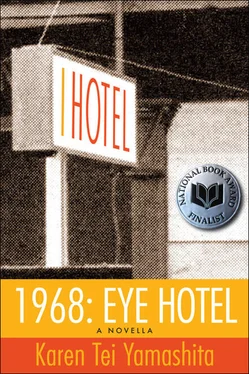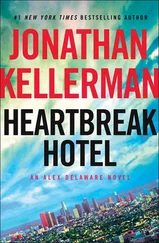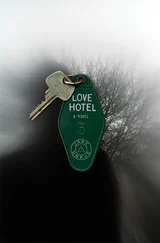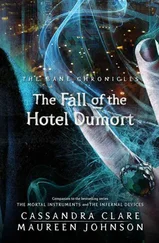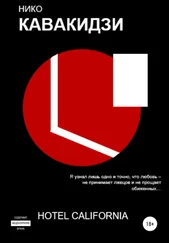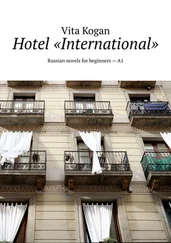Later, Auntie sits down in the kitchen. Writes a list:
one full set of clothing including best suit
don’t forget socks and shoes
reading glasses
brush
newspapers
mah-jongg set
bottle of French cognac
What else?
his favorite things
like favorite pen or favorite book
Pentax box camera
“O.K.,” says Auntie. “You have to find these things. If the clothes are dirty, you bring them to me tomorrow morning and I’ll wash them. Remember. His best suit. The one he wears to,” she pauses foolishly, “funerals. Bring everything tomorrow. Maybe we need to get it dry cleaned, too.”
“Why the favorite things?”
“We put these things with him in his coffin, to make his journey.”
“Auntie, maybe he wouldn’t want us to do this.” Paul can’t help it, but he yawns. He’s been up all night in the study trying to read his dad’s old letters. “Maybe he didn’t believe in the journey.”
“What are you talking about?”
“Camus?” he suggests. “Existentialism.”
Auntie huffs, “What did he pump into your young mind? All that’s irrelevant when you die in Chinatown.”
Yes, ma’am, all that’s irrelevant when you die in Viet’nam. To celebrate the Tet, nineteen VC commandos charge through the walls of the U.S. embassy compound in Saigon with antitank rockets. Marines hold them off until they get a helicopter of the Airborne in to finish up this mess. When it’s over, you got nineteen dead VC, two dead Vietnamese civilians, and five dead American boys. And we’re watching the action all on TV, dig? But that’s just the embassy. The North Vietnamese have infiltrated the entire city, coming in on holiday with their ammo hid under flowers, rice, and vegetables. It’s a peasant surprise. Presidential Palace, South Vietnamese Army headquarters, Westmoreland’s headquarters, radio station, and the air bases all attacked. Aircraft crippled, neighborhoods reduced to rubble, two million new refugees. Ol’Walter pulls you back to the map, and you see the DMZ, line that marks North from South, and you say hey, that’s a long ways away from Saigon. What’s the war doing down there in the deep South? Hey, Westmoreland, are we winning this war or not? And if we are, why are twenty-six hearts and minds bleeding there on the floor of our U.S. courtyard, what you call U.S. soil?
By the time Paul’s father’s wake comes along, Saigon the city is under control. The war’s pushed to the outside villages, which is easy because all they got to do now is destroy them. Like the lady at the front of the Cathay mortuary who is burning paper—joss paper, otherworld paper money, paper clothing, paper replicas of cars, televisions, houses, servants, everything going up in symbolic smoke to send along with Dad in the next world. Paul can see the flames go up and smolder, reflecting off the shiny brass along the casket. The pungent smell of incense and burning paper swirls through the room. Paul’s dad is dressed in his best suit, sleeping on a satin bed in a beautiful box with all his favorite things.
Auntie and her husband and their five children and their children are all there. There are other cousins too, but Auntie says they are paper cousins, so do they count? If they’re not careful, lady in the front might grab them, send them up in symbolic smoke.
The Association president is there. So are Paul’s dad’s office manager, the typesetter, and Mr. Fung, who practically does all the writing and photos for the newspaper. It’s just a small operation. His dad’s been publishing this local paper since his mother died maybe twelve years ago. Auntie says her brother went to hide inside that paper, use it to publish what was in his mind. She doesn’t say that no one reads it; at least she never did. She reads Mr. Fung’s articles about events in Chinatown, but she never understood her brother’s writing—all those complicated philosophical ideas of his. Well, his friends always said he was brilliant, and they got their brilliant writing in print too. Paper comes out once a week on Friday, so today’s paper’s a big photo with a full-page obituary. Readers maybe don’t know the whole paper is Paul’s dad, and maybe this is the last issue. Auntie folds a fresh copy and tucks it in with her brother. She inspects everything: can of tea, passport, reading glasses, calligraphy brush, bottle of French cognac.
“Oh,” she notices and says to Paul, “you found his old Pentax box camera.” She approves. “He loved that camera and took so many pictures with it.” Then she notices a book resting in the satin. “What’s this?” she asks.
“Favorite book, you said,” Paul mutters quietly.
“ Capital ?” she whispers. Even Auntie knows Karl Marx.
“Ah yeah, it was the book he was reading these days.”
“Favorite?”
“He always said the book he was reading was his favorite.”
Auntie’s exasperated, but she smiles and looks around. She slips the book out and hugs the cover to her bosom. “Do you want to get us in trouble?” she squeaks, bowing three times.
“But—”
“Bow three times,” she interjects. “Customary to do so,” she instructs, and moves away with Marx under cover. Outside, she shoves the un-American book at Paul and hisses, “Get rid of this.”
Meanwhile, under cover of air and artillery blasting away at the fat walls of the Citadel, Marines in assault craft ply the Perfume River to its banks to take back the sacred city of Hue. Who will bow three times to bless the blood lapping at the shore?
Next day at the funeral, Paul wears a black suit, a black waistband, and a black band on his left arm. The waistband means he’s the oldest son. He knows people see it and think that that’s not all it means. He’s too young to be wearing this waistband, too young to take his father’s place. Now the Chinatown community files in, solemnly bowing three times, one by one, and filling the pews at the Cathay. They’ve sent wreaths of flowers with ribbons naming the family, institution, or shop Paul’s father did business with.
And now Paul’s got to be the oldest only son, approach the casket to perform the blanket ceremony. If only there were other sons: a third son to place the white blanket of heaven, a second son to place the red blanket of life, a first son to place the gold blanket of spirituality splashed with red characters. If only there were ten sons to place ten blankets, to send his father warmly into his spirit life. But Paul’s the only son, so he surreptitiously hides Karl Marx under the folded blankets, shrouds his father’s traveling body with each eternal blanket, tucking the pei in to hide Dad’s unfinished reading. Paul thinks, even if it’s not his daddy’s journey, it’s their journey: Auntie’s journey, Mr. Fung’s, the Benevolent Association, his father’s writing buddies. It’s their journey, dig? It might be Karl’s too. Back of the hall, paper-burning lady’s going at it with the matches. Could have given her his dad’s entire library plus his paintings, burn it all up to heaven.
Endless eulogies, three bows per person, and condolences take forever, but finally the pallbearers get the casket out into the long hearse. They make Paul sit in the Cadillac convertible with a giant wreathed photo of his dad. The Cathay brass band of twelve old white guys in maroon outfits starts in with their signature tune, “Nearer My God to Thee,” and marches in front of the convertible Cad. Paul looks back at the hearse following. All the other cars follow the hearse. He’s on parade through Chinatown. Everyone on the street is staring at him and the giant photo. Does he look like a younger version of his dad? Chinese look to see if they recognize the guy in the photo. Kids run alongside the band and then the Cad, like it’s a continuation of New Year’s, and tourists snap their Brownies. He can hear the tourists saying, “The band is playing ‘Onward Christian Soldiers.’ Can you beat that in Chinatown? These folks are Christian too. Honey, is that yellow confetti they’re throwing out of the cars? How festive!” Paul grips his dad’s photo and hides behind it, every nerve in his body electrocuted by an overloaded circuitry of grief and humiliation.
Читать дальше
